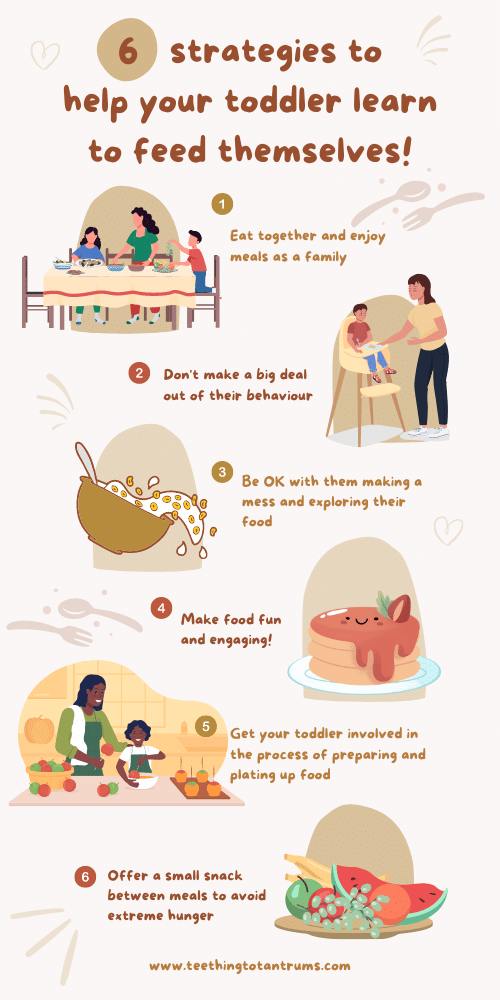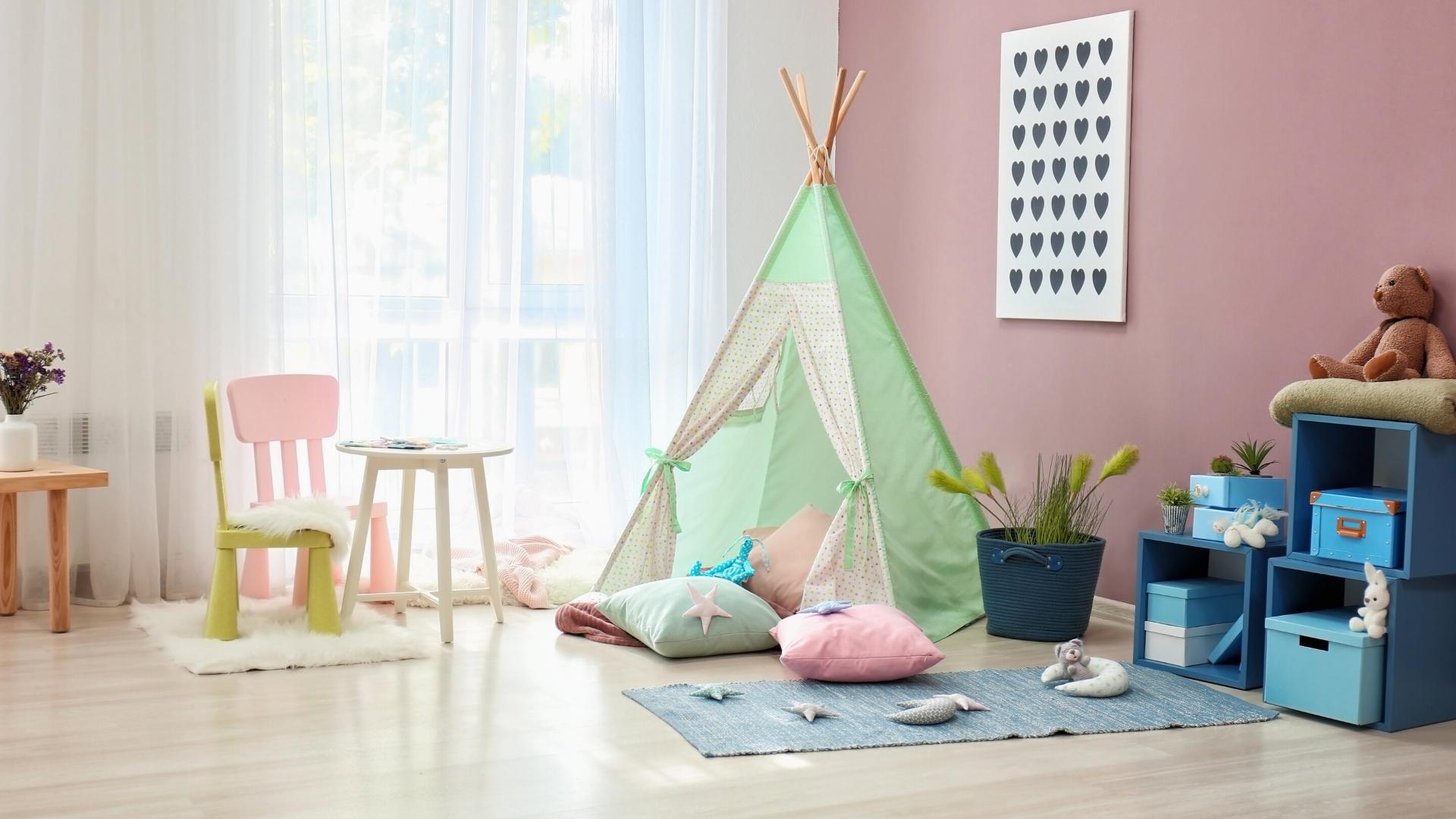Do you feel like screaming “my toddler won’t feed himself and I don’t know what to do!” to anyone who will listen? And find your mealtimes turning into battlegrounds and worrying if this phase will ever end?
Help! My Toddler Won’t Feed Himself!
Before we being… I want you to know that you are not alone.
There are a lot of toddlers out there who do not want to feed themselves and seem uninterested in food.
In fact… I am a parent who has experienced this with my own son too.
I found myself saying “Help! My toddler won’t feed himself!” when he was 2 and I will be explaining more about what happened and what we did to fix the issue later on in the article.
Why Does My Toddler Refuse To Feed Himself?
There are many reasons why your toddler may be refusing to feed himself and it usually connects to them feeling nervous about food, ashamed about being messy, isolated when eating or feeling irritable and frustrated.
So, ask yourself:
- Has your toddler ever learnt to finger-feed? Not knowing how to grasp food properly can make self-feeding a very frustrating and slow process for a hungry toddler.
- Does your toddler mostly eat alone? Toddlers who eat alone are often lonely and make a scene to get your attention. They will not eat because it means you will have to stay with them and encourage them to eat.
- Have you always fed your toddler up until now? If you’ve always prepared their food for them, why would they want to do it themselves all of a sudden? They had a good thing going!
- Is your toddler a very fussy eater? Food aversions and picky eating are two different things that need to be handled correctly. Keep reading to learn more about this.
- Does your toddler not like feeling messy? Feeling sticky and dirty can be very overstimulating for some toddlers. Therefore, they may not want to feed themselves because they hate the feeling afterwards.
- Are meal times often a battleground? If mealtimes have been a struggle for a while, they will have become a part of your toddler’s routine and will require patience and consistency to break the habit of not feeding themselves.
- Has your child been experiencing broken sleep and feeling tired and irritable? Having irregular naps and bedtimes can make your toddler cranky and irritable. Combine these emotions with a circadian rhythm that is out of sync and your toddler will be hungry at inconsistent times throughout the day and you will struggle to get them to feed themselves when appropriate.
Any one or a combination of the above could be the root cause of your toddler refusing to feed themselves. Keep reading to learn my strategies to handle these scenarios and get your toddler to feed themselves quickly and easily.
Looking to get your little one to sleep quickly and effortlessly? Check out my Bedtime and Nap Cheat Sheet and master the art of making daytime naps and bedtimes as seamless as possible.
A bedtime & nap cheat sheet so good your little one will ask you to put them to bed...
Laura Williams "This is a life saver! I'm so glad I downloaded your bedtime & nap cheat sheet. My little one actually asked me to put him to bed last night! Unbelievable! Thank you so much!"
Click Here For The FREE Cheat Sheet
6 Strategies To Help Your Toddler Learn To Feed Himself
If your toddler refuses to self-feed, here are my top techniques to help get them comfortable with feeding themselves:

1. Eat Together
If your toddler eats their meals at different times than you it’s very easy to focus on what they’re NOT doing. Therefore, eating family meals together may encourage them to eat independently.
Toddlers love to copy others so watching others eat and enjoy their food may be all it takes to encourage them to feed themselves.
As I briefly mentioned earlier, at mealtimes, start by loading the spoon or fork with food and leave it resting on the side of your toddler’s suction plate to use if they wish. Then focus on eating your meal yourself.
If your toddler feels that they are not being forced to feed themselves by having your full attention, then the chances are they will gradually just join in and start feeding independently like everyone else.
With the best suction on the market, these baby plates will go nowhere when your little one is learning to feed themselves. With the added benefit of being dishwasher safe and coming up clean and odour free every time this little bowl ticks all the essentials for me.
TOP TIP: It is important to always offer your toddler food in the high chair or at the table. Don’t feed your child in front of the TV or while they are wandering around the room.
2. Don’t Make A Big Deal Out Of Their Behaviour
This is a big one. Do not make a big deal about them NOT eating independently.
Get on with your meal and chat about the day, without focusing on whether your toddler is feeding themselves or not.
Again, if your toddler feels less pressure to eat a certain way, you may be surprised by how easily they may then feed themselves.
3. Be OK With Making A Mess
The learning process of feeding yourself solid food is a messy one. And it is really important to let your toddler make a mess when they are learning to feed themselves.
If you have not allowed them to do this, then your little one may find it hard to experiment when feeding themselves. Remember, the emphasis is on self-feeding and NOT how tidily it can be done. (That can come later.)
If you are worried about your toddler making a mess as you encourage them to feed themselves then invest in a splat mat and bib set.
On the other hand… some toddlers don’t like messy eating.
And if your toddler falls into this category, then until they are old enough to use a spoon and fork properly (around 18-24 months), you will probably have to do most of the feeding.
However, once your little one has fine motor skills, you should encourage them to feed themselves by loading the spoon or fork first and make sure your toddler has a tissue to wipe their face and hands with to avoid a distressed, messy meltdown.
4. Make Food Fun
Another way to encourage your toddler to feed themselves is to make food fun.
- Cut sandwiches into funny and interesting shapes,
- Arrange pieces of food on the plate that has a face and then get your toddler to point at the nose and eyes,
- Make trees with broccoli and flower petals from strawberry slices and ask them to pluck the petals.
The possibilities are endless. Just let your imagination lead the way.
This way mealtimes become exciting and something your toddler looks forward to. And if they can interact with their food, they are more likely to feed themselves too.
5. Get Them Involved In The Process
As your toddler gets older, encourage them to help prepare the food they are going to eat.
You can start with simple baking and move on to more elaborate meals as they get older. Ask them what they would like to eat but be careful not to offer too many options (2 choices is plenty for young toddlers).
- Ask if they would like ham or cheese in a sandwich and in which order the sandwich should be layered in
- Ask if they would like to help mix up the bolognese sauce you’re making for dinner and let them choose which pasta shape they would like to go with it.
By participating in the making of nutritious food, your toddler will be more likely to want to eat it.
For some great recipe ideas for toddler, I love the Little Helpers Toddler Cookbook. If you want to get your reluctant eater interested in food then give this little gem a try.
6. Offer Small Snacks Between Meals To Avoid Extreme Hunger
If your toddler struggles to feed themselves at mealtimes, a small snack between meals (so they don’t get too full) can help ease the pressure of your child having to eat at lunch or dinner time.
Snacks such as strings of cheese, mashed banana, soft fruit and yogurt pouches are all good options.
The easing of mealtime pressure will help your toddler feel more relaxed and if they’re not extremely hungry, they may be more likely to enjoy playing with their food, exploring the textures and choosing to eat it if they choose.
TOP TIP: Do not fall into the trap of giving your child too many snacks throughout the day, as this will backfire when your toddler will be too full and not want to eat anything when mealtime comes around.
Why Is Self-Feeding Important?
Self-feeding is important for developing your child’s fine motor skills and food confidence.
This includes learning to pick food up with their hands, fingers and utensils, which requires complex pincer movements that their hand and wrist muscles need to develop over time.
They also learn how to pick up and hold various sizes of food and objects which will go a long way to helping them learn to balance towers of blocks, cut out shapes and eventually, write their name.
Self-feeding also helps to develop a healthy relationship with food as your toddler can experience food exploration, learn their fullness cues, have fun with their favorite foods and develop healthy eating habits for years to come.
Fussy Eater Or Food Aversion?
As I mentioned earlier, another reason why your toddler may not be feeding themselves is that they are just not that interested in food or have an aversion to food.
While all toddlers can be picky about certain foods, some are particularly fussy or may even have a food aversion.
If this is the case, their desire to eat will be decreased and they may only eat if you are helping them.
My Son’s Journey With Refusing To Feed Himself
During all my years as a nanny, I never come across a single child that was any more than the occasionally picky eater… However, my own son was a different story.
In the beginning, when he refused to feed himself, I thought he was just being a picky eater…
However, eventually, I realised that he actually had a food aversion to certain consistencies of food which resulted in him gagging on mushy foods.
Sometimes to the point of being sick when he ate them.
This made weaning to soft foods rather a difficult process for us!
He refused to eat anything that was mushy such as porridge, mashed potato and even banana. And he would only eat dry food with my encouragement and support.
It took a long time to teach him to eat independently and be OK with me not getting the food ready on a utensil for him.
And I will be the first to admit, that this journey was very hard to get through. As a parent, you want to see your child eating a varied diet so they can grow up to be big and strong…
And when that isn’t happening… you think you’re failing them.
So, here’s my advice based on what I learnt and did… If your toddler shows signs of not liking certain food textures, then don’t force them to eat them.
Offer them healthy food choices that they do like (even if that is not a huge variety).
As long as they are eating a few foods from across the nutritional food categories you’re doing fine.
The key is to take the pressure off your toddler and get them interested in the food they will be eating. Then once your toddler knows that you’re NOT going to give them ‘horrible’ food, you can begin to teach them to feed themselves in confidence.

Frequently Asked Questions About My Toddler Won’t Feed Himself
Looking for more information about why your toddler won’t feed themselves? Here are the answers to the most common questions.
What Are The 3 Stages Of Feeding?
The three stages of independent feeding are:
- Eating with fingers,
- Using a spoon,
- Self-feeding with a fork.
Start by offering your toddler finger foods that they can easily eat independently. Such as vegetable or mozzarella sticks, chopped-up fruit and pieces of pasta.
Next, let them hold onto a spoon whilst you are feeding them so that they can have a go if they want to but there is no pressure on them if they don’t.
You can then try loading the spoon with food and resting it on the side of the plate for them to feed themselves. Remember to celebrate enthusiastically every time they use the spoon.
Although this still requires you to do most of the work… it is one step closer to getting your toddler to feed independently.
Once they have got the hang of using the spoon, introduce a fork and follow the same loading process until they are able to do it themselves.
When Will My Child Eat with a Spoon?
Most children will eat with a spoon without any assistance by age 2. However, most toddlers will happily (albeit messily!) be using a spoon independently by the time they’re one year of age.
TOP TIP: Don’t ban finger feeding if feel your toddler is old enough to use a spoon. If they’re not feeding themselves, it may be because they feel pressured to use a utensil. Just encourage the use of a spoon but don’t turn it into a battle.
When Will My Child Eat With A Fork?
Fork feeding follows after learning to eat with a spoon and mastering the pincer grasp motor skill. This typically happens around 2 years old. There is not any pressure to move onto a fork as quickly as possible, the aim is to get your child to eat independently.
When Should Toddlers Be Able To Self-Feed?
Most toddlers will be able to self-feed between 1 and 2 years. Along this timeline, you will see your toddler’s confidence grow with self-feeding as they develop the necessary fine motor skills required to eat independently with a spoon or a fork.
Do I Need To Worry About Developmental Delays?
If your child is older than 3 and they’re still struggling to self-feed, I would recommend consulting your pediatrician or a specialist childhood food consultant to rule out any developmental delays that might be triggering your toddler’s refusal to feed themself.
TOP TIP: Remember, most of the time, refusing to feed themselves is simply a phase your toddler will go through. Remain patient and consistent and the skill will come. How many adults do you know who cannot feed themselves?
Need More Parenting Help?
- Download our FREE Bedtime & Nap Sleep Cheat Sheet. It’s a free, easy-to-use and proven formula designed for parents of 0-5 year olds to master the art of consistently undisturbed and restful sleep without the yelling, nagging or exhausting long-winded evenings.
- Check out our Parenting Toolbox. You’ll get access to expertly-chosen products that you can guarantee are the best for your little one and your wallet.
- Are you looking for personalized guidance to navigate the challenges of parenting? I offer 1-on-1 consultations to bring you tailored strategies and actionable advice to help support your child's growth and well-being with confidence.

A bedtime & nap cheat sheet so good your little one will ask you to put them to bed...
Laura Williams "This is a life saver! I'm so glad I downloaded your bedtime & nap cheat sheet. My little one actually asked me to put him to bed last night! Unbelievable! Thank you so much!"
Click Here For The FREE Cheat Sheet





